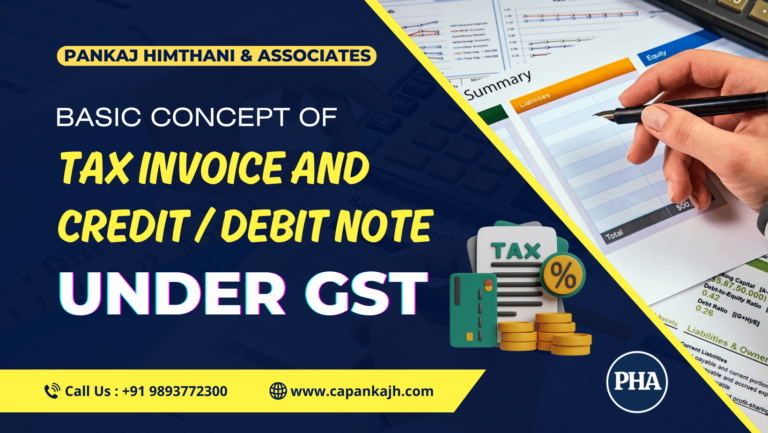Unveiling the Essentials of Tax Invoices in GST

Under the Goods and Services Tax (GST) regime in India, tax invoices, credit notes, and debit notes play a crucial role in documenting transactions and facilitating the flow of input tax credit (ITC) across the supply chain. Here’s a basic concept of tax invoice, credit note, and debit note under GST:
Tax Invoice:
- A tax invoice is a document issued by a registered supplier of goods or services to the recipient, containing details of the transaction such as the description of goods or services, quantity, value, tax charged, and other prescribed particulars.
- A tax invoice is essential for claiming input tax credit (ITC) by the recipient and serves as evidence of the supply of goods or services for both the supplier and the recipient.
- Tax invoices must be issued in accordance with the provisions of the GST law and should contain mandatory details such as the GSTIN of the supplier and recipient, invoice number, date of issue, HSN/SAC codes, and other prescribed particulars.
Credit Note:
- A credit note is a document issued by a supplier to the recipient for reducing the value of a tax invoice already issued. It is typically issued in cases where there is a reduction in the value of taxable supplies, such as sales returns, discounts, or adjustments in the invoice amount.
- Credit notes enable the supplier to adjust the tax liability and the recipient to claim a refund of excess tax paid or adjust the input tax credit (ITC) claimed on the original tax invoice.
- Credit notes must be issued within a specified time frame and contain details such as the original invoice number, date, and value, along with the reasons for issuing the credit note and the revised taxable value and tax amount.
Debit Note:
- A debit note is a document issued by a supplier to the recipient for increasing the value of a tax invoice already issued. It is typically issued in cases where there is an increase in the value of taxable supplies, such as additional charges, interest, or penalties.
- Debit notes enable the supplier to adjust the tax liability and the recipient to adjust the input tax credit (ITC) claimed on the original tax invoice.
- Debit notes must be issued within a specified time frame and contain details such as the original invoice number, date, and value, along with the reasons for issuing the debit note and the revised taxable value and tax amount.
Importance under GST:
- Tax invoices, credit notes, and debit notes are essential for maintaining accurate records, complying with GST regulations, and facilitating the reconciliation of input tax credit (ITC) claimed by the recipient with the tax liability discharged by the supplier.
- Proper documentation and compliance with the prescribed formats and procedures for issuing tax invoices, credit notes, and debit notes are crucial to avoid penalties, disputes, and legal consequences under the GST law.
FAQ's related to Tax Invoices
The tax invoice issued under GST must contain various mandatory details such as the name, address, and GSTIN of the supplier and recipient, invoice number, date of issue, description of goods or services, quantity, value, tax charged, and other prescribed particulars.
Yes, it is mandatory for registered suppliers to issue a tax invoice for every taxable supply of goods or services made to a registered recipient. Failure to issue a tax invoice may attract penalties under the GST law.
Yes, tax invoices can be issued electronically in compliance with the provisions of the GST law. Electronic invoices (e-invoices) generated through the GST portal or electronic invoicing platforms are considered valid for GST compliance purposes.
FAQ's related to Credit Note:
A supplier can issue a credit note under GST in cases where there is a reduction in the value of taxable supplies, such as sales returns, discounts, or adjustments in the invoice amount. Credit notes enable the supplier to adjust the tax liability and the recipient to claim a refund of excess tax paid or adjust input tax credit (ITC).
A credit note must be issued by the supplier within the time frame specified under the GST law, which is generally before September of the following financial year or before filing the annual return, whichever is earlier.
FAQ's related to Debit Note:
A supplier can issue a debit note under GST in cases where there is an increase in the value of taxable supplies, such as additional charges, interest, or penalties. Debit notes enable the supplier to adjust the tax liability and the recipient to adjust input tax credit (ITC).
Similar to credit notes, a debit note must be issued by the supplier within the time frame specified under the GST law, generally before September of the following financial year or before filing the annual return, whichever is earlier.
Yes, tax invoices can be issued electronically in compliance with the provisions of the GST law. Electronic invoices (e-invoices) generated through the GST portal or electronic invoicing platforms are considered valid for GST compliance purposes.

